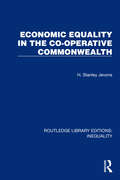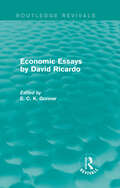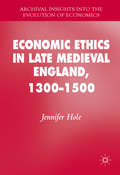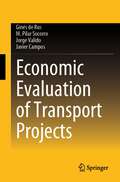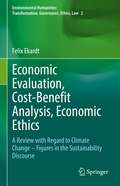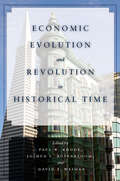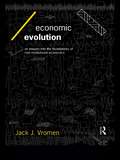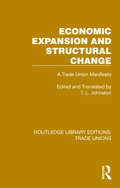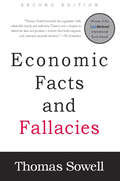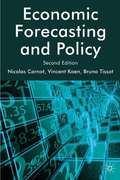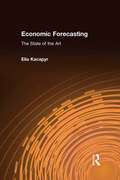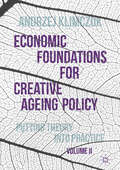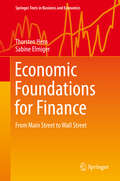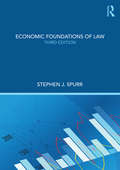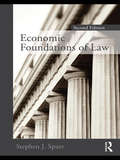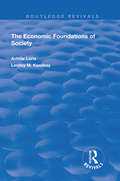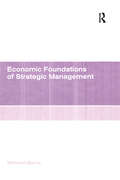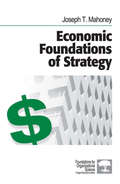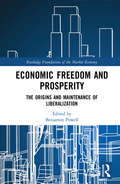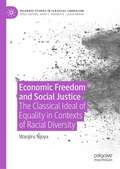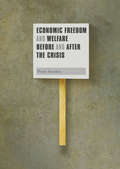- Table View
- List View
Economic Equality in the Co-Operative Commonwealth (Routledge Library Editions: Inequality #5)
by H. Stanley JevonsOriginally published in 1933 in the midst of the Great Depression, this book discussed the possibility of a new and orderly economic system to realize social justice. The author argued that nothing but the complete equality of reward could ensure a stable order. Although utopian in its outlook, the book addressed many of the concerns of the (then) existing order. The book explains the origin of differences between different people, give a brief account of the economic theory of the capitalist system and investigates the economics of the growing demand for social and economic equality. It then discusses in more detail the most efficient economic organization to provide and safeguard the welfare of the population on the basis of equality, followed by a discussion of the economic principles involved in price-fixing and foreign trade.
Economic Essays by David Ricardo: Economic Essays By David Ricardo (Routledge Revivals)
by E. C. K. GonnerDavid Ricardo (1772 – 1823) was a hugely influential British political economist and stock trader. This volume, first published in 1923, contains five important pamphlets published by him, edited and with an overarching introductory essay by E. C. K. Gonner. Each essay relates either to monetary and financial subjects - including the high price of Bullion, monetary theory and the position of the Bank of England - or to the agricultural conditions of Britain and proposed solutions to the problems discussed. This is a fascinating and detailed work, which will be of great value to those with an interest in Ricardo’s theories and British economic history.
Economic Ethics in Late Medieval England, 1300–1500
by Jennifer HoleDrawing on an array of archival evidence from court records to the poems of Chaucer, this work explores how medieval thinkers understood economic activity, how their ideas were transmitted and the extent to which they were accepted. Moving beyond the impersonal operations of an economy to its ethical dimension, Hole's socio-cultural study considers not only the ideas and beliefs of theologians and philosophers, but how these influenced assumptions and preoccupations about material concerns in late medieval English society. Beginning with late medieval English writings on economic ethics and its origins, the author illuminates a society which, although strictly hierarchical and unequal, nevertheless fostered expectations that all its members should avoid greed and excess consumption. Throughout, Hole aims to show that economic ethics had a broader application than trade and usury in late medieval England.
Economic Evaluation of Transport Projects
by Javier Campos Ginés de Rus M. Pilar Socorro Jorge ValidoThis book is a guide to the economic evaluation of transport policies and investment projects through cost-benefit analysis (CBA). It covers the CBA of transportation projects and policies, and introduces the fundamental concepts of CBA before considering their application in real-world settings.A distinct focus of the book is on the practical applications of CBA. It includes real-world examples of CBA, such as high-speed rail investment and the subsidization of air transport, which illustrate the importance of using a rigorous analytical framework to evaluate transport projects and policies.The primary objective of this book is to present a basic model for the evaluation of transport projects and policies, with explicit assumptions and practical evaluation rules derived from it. The rules and measurement criteria derived from this model are applied to the examples mentioned above.Overall, this book is an excellent resource for students, practitioners, and policymakers involved in transport economics and evaluation, as it provides a comprehensive understanding of the principles and applications of CBA in the transport sector.
Economic Evaluation, Cost-Benefit Analysis, Economic Ethics: A Review with Regard to Climate Change – Figures in the Sustainability Discourse (Environmental Humanities: Transformation, Governance, Ethics, Law)
by Felix EkardtWith cost-benefit analysis, economic sciences cultivate a specific decision-making procedure, which has also been partially adopted in politics. Although economists do not experience the approach as normative, on closer examination the approach can be identified as an economic ethics. The present philosophical and at the same time transdisciplinary (with special legal and economic components) treatment examines the persuasive power of this approach using climate change as an example, as the most important sustainability issue. The objections raised against the economisation of decision-making with regard to the utilitarian tradition, such as the criticism of the orientation towards weighing up options, the alleged lack of distributive justice or the tendency to describe people in behavioural science as selfish, are hardly or not at all convincing on closer examination. In several respects, however, it turns out that cost-benefit analysis faces insoluble problems. Firstly, the theoretical basis of (hidden normative) cost-benefit analysis in philosophical empiricism does not seem tenable. This means the idea of empiricism that normative questions must be transformed into questions of factual (countable and reproduceable) preferences of people. Secondly, there are massive collisions of cost-benefit analysis with a liberal-democratic constitutional law, whose principles are universal ethical principles. This concerns both freedom rights (which must not depend on the ability of humans to pay) and the model of democracy and respect for the rule of law. Thirdly, insoluble problems of application arise for cost-benefit analyses, which are particularly (but not only) apparent in the context of climate protection, in general considerations as in the case of legislation as well as in individual analyses, as done when constructing a coal-fired power plant. A strongly deflated cost-benefit analysis could nevertheless contribute factual material – such as partial aspects of decision consequences that can actually be depicted in monetary terms – to ethical or legal decision-making processes. In this respect the approach appears helpful and complementary, but not beyond that.
Economic Evidence on the Globalization of Markets
by Pankaj GhemawatPresents the systematic evidence in the context of the microeconomic model of market integration. Market integration is just one (economic) aspect of globalization; this is one of the particular interests to business managers.
Economic Evolution and Revolution in Historical Time
by Paul W. Rhode Joshua L. Rosenbloom David F. WeimanThis book challenges the static, ahistorical models on which Economics continues to rely. These models presume that markets operate on a "frictionless" plane where abstract forces play out independent of their institutional and spatial contexts, and of the influences of the past. In reality, at any point in time exogenous factors are themselves outcomes of complex historical processes. They are shaped by institutional and spatial contexts, which are "carriers of history," including past economic dynamics and market outcomes. To examine the connections between gradual, evolutionary change and more dramatic, revolutionary shifts the text takes on a wide array of historically salient economic questions-ranging from how formative, European encounters reconfigured the political economies of indigenous populations in Africa, the Americas, and Australia to how the rise and fall of the New Deal order reconfigured labor market institutions and outcomes in the twentieth century United States. These explorations are joined by a common focus on formative institutions, spatial structures, and market processes. Through historically informed economic analyses, contributors recognize the myriad interdependencies among these three frames, as well as their distinct logics and temporal rhythms.
Economic Evolution: An Inquiry into the Foundations of the New Institutional Economics (Economics As Social Theory Ser.)
by Jack J VromenThe new institutional economics offers one of the most exciting research agendas in economics today. Yet can it really explain processes of economic change? Economic Evolution explores three of the main approaches within the new institutional economics:* the new theory of the firm,* Nelson and Winter's evolutionary economics * game theoretic accoun
Economic Expansion and Structural Change: A Trade Union Manifesto (Routledge Library Editions: Trade Unions #14)
by T. L. JohnstonOriginally published in 1963, The Landsorganisationen I Sverige (LO – Swedish Confederation of Trades Unions), enjoys an international reputation as a trade union movement with progressive ideas on wage policy and collective bargaining. The authors of this volume who are trade union economists, deal critically with credit policy; plead for free trade; are outspoken on company taxation, wage policy, the labour market and the location of industry. Throughout the authors are outspoken in their emphasis on growth and change, which they interpret as change in the outlook of the unions as well as in that of industry and of the government.
Economic Fables
by Ariel RubinsteinPart memoir, part crash-course in economic theory, this deeply engaging book by one of the world's foremost economists looks at economic ideas through a personal lens. Together with an introduction to some of the central concepts in modern economic thought, Ariel Rubinstein offers some powerful and entertaining reflections on his childhood, family and career. In doing so, he challenges many of the central tenets of game theory, and sheds light on the role economics can play in society at large. The book is as thought-provoking for seasoned economists as it is enlightening for newcomers to the field.
Economic Facts and Fallacies: Second Edition
by Thomas SowellEconomic Facts and Fallaciesexposes some of the most popular fallacies about economic issues-and does so in a lively manner and without requiring any prior knowledge of economics by the reader. These include many beliefs widely disseminated in the media and by politicians, such as mistaken ideas about urban problems, income differences, male-female economic differences, as well as economics fallacies about academia, about race, and about Third World countries. One of the themes ofEconomic Facts and Fallaciesis that fallacies are not simply crazy ideas but in fact have a certain plausibility that gives them their staying power-and makes careful examination of their flaws both necessary and important, as well as sometimes humorous. Written in the easy-to-follow style of the author’sBasic Economics, this latest book is able to go into greater depth, with real world examples, on specific issues.
Economic Forecasting and Policy
by Vincent Koen Nicolas Carnot Bruno TissotEconomic Forecasting provides a comprehensive overview of macroeconomic forecasting. The focus is first on a wide range of theories as well as empirical methods: business cycle analysis, time series methods, macroeconomic models, medium and long-run projections, fiscal and financial forecasts, and sectoral forecasting.
Economic Forecasting: The State of the Art
by Elia XacapyrAn overview of the macroeconomic forecasting industry in the United States that explains and evaluates the forecasting techniques used to make predictions about various aspects of the national economy.
Economic Foundations for Creative Ageing Policy, Volume II
by Andrzej KlimczukAging populations are a major consideration for socio-economic development in the early 21st century. This demographic change is mainly seen as a threat rather than as an opportunity to improve the quality of human life. Aging population is taking place in every continent of the world with Europe in the least favourable situation due to its aging population and reduction in economic competitiveness. Economic Foundations for Creative Aging Policy offers public policy ideas to construct positive answers for ageing populations. This exciting new volume searches for economic solutions that can enable effective social policy concerning the elderly. Klimczuk covers theoretical analysis and case study descriptions of good practices, to suggest strategies that could be internationally popularised.
Economic Foundations for Finance: From Main Street to Wall Street (Springer Texts in Business and Economics)
by Thorsten Hens Sabine ElmigerThis book provides readers with essential concepts from financial economics for an integrated study of the financial system and the real economy. It discusses how long-term market prices are determined and affected by population growth, technological progress and non-renewable resources. The meaning of market prices is examined from the perspective of households and from the perspective of firms. The book therefore connects different fields of finance, which usually focus only on either the households’ side or the firms’ side.
Economic Foundations of Law
by Stephen J. SpurrThe third edition of Economic Foundations of Law introduces readers to the economic analysis of the major areas of the law: property law, torts, contracts, criminal law, civil procedure, corporation law and financial markets, taxation, and labor law. No prior knowledge of law is required, but a prior course in the principles of microeconomics would be quite helpful. The text opens with a review of the basic principles of price theory and an overview of the legal system, to ensure readers are equipped with the tools necessary for economic analysis of the law. The third edition provides expanded or new coverage of key topics including intellectual property law, how the creation of new forms of property rights affects the conservation of species such as elephants and fish, controversies involving liability for medical malpractice and class actions, the transformation of personal injury litigation by the intervention of insurance companies as plaintiffs, how to predict the outcome of litigation with game theory, an economic analysis of the ownership and use of guns, bankruptcy law and the economics of bank regulation. Comprehensive and well-written, this text is a compelling introduction to law and economics that is accessible to both economics and law students.
Economic Foundations of Law second edition
by Stephen SpurrEconomic Foundations of Law (2nd ed.) provides an economic analysis of the major areas of the law: property law, torts, contracts, criminal law, civil procedure, corporation law and financial markets, taxation and labor law. In line with current trends in legal scholarship, discussion is focused on economic principles such as risk aversion, efficiency, opportunity cost, moral hazard, rent-seeking behaviour and economies of scale. Accessible, comprehensive and well written, this book uses extensive practical examples and explanations to illustrate key points. There are numerous applications to lawyers and the legal profession, with detailed discussions of subjects as diverse as the proposed market for transplantable human organs, the market for adoptions, the market for bail bonds, the unanticipated effects of Megan’s law, and issues of racial profiling. Fully updated and revised, a new chapter on labor law has also been included.
Economic Foundations of Society: Translated From The Second French Edition By Lindley M. Keasbey With A New Preface By The Author (Routledge Revivals)
by Achille LoriaThis book examines the societies of the civilised world - old and new - and its two distinct and separate classes. Whilst one class accumulates in utter idleness enormous and ever increasing revenues, the other, far more numerous, labours life-long for miserable wages. One class lives without working, the other works without living or without a life worthwhile. When confronted by such a contrast, the question must at once occur to every mind: is this sad state of affairs the result of inherent necessity, inseparable from the organic conditions of human nature; or is it merely the outcome of certain historical tendencies that are destined to disappear at a later stage of social evolution? It concludes that the truth is to be found in the latter alternative: that capitalistic property, with its caste division of humanity into capitalists and labourers, is by no means the product of conditions inherent in human nature, but simply the result of powerful historical causes which will eventually disappear. A variety of facts are presented in support of this argument.
Economic Foundations of Strategic Management
by Mehmet BarcaThis book explores the extent to which economic theory is able to provide the theoretical foundations of strategic management. To this end it draws on the philosophy of science; microeconomic theory; and different approaches to strategic management. The work shows that many of the propositions of strategic management are deducible from the economic theories considered. It argues that these propositions should be made open to empirical testing and that a unified theory of strategic management should be developed. Thus the book addresses a current major concern of theorists - that strategy remains ’atheoretical’ and that this reduces the predictive power of the subject and hampers further theory development. The essential contribution made is that economic theory should be systematically explored in order to establish the foundations of business strategy.
Economic Foundations of Strategy
by Dr Joseph T. MahoneyEconomic Foundations of Strategy provides not only the essential basic tenets of strategy, it also shows the inter-relationships of five major theories of the firm: the behavioral theory; transaction costs theory; property rights theory; agency theory; and dynamic resource-based theory. Even though technological, organizational and institutional change advances breathlessly, the theories of the firm provided in this research book are durable principles that have stood, and the author maintains will continue to stand, the test of time. Economic Foundations of Strategy emphasizes the complementarities among these five theories of organization, and the potential for integrating these theories in the evolving science of organization. Applications of these theories to business practice are emphasized throughout the book.
Economic Foundations of Symmetric Programming
by Quirino ParisThe search for symmetry is part of the fundamental scientific paradigm in mathematics and physics. Can this be valid also for economics? This book represents an attempt to explore this possibility. The behavior of price-taking producers, monopolists, monopsonists, sectoral market equilibria, behavior under risk and uncertainty, and two-person zero- and non-zero-sum games are analyzed and discussed under the unifying structure called the linear complementarity problem. Furthermore, the equilibrium problem allows for the relaxation of often-stated but unnecessary assumptions. This unifying approach offers the advantage of a better understanding of the structure of economic models. It also introduces the simplest and most elegant algorithm for solving a wide class of problems.
Economic Framework for Assessing Development Impact
by Benjamin C. Esty Carrie Ferman Frank J. LysyDiscusses the differences between private and social returns and describes an economic framework for assessing a project's social return [known as the economic rate of return (ERR)]. The framework begins by analyzing the impact of a new project on private financiers [the private return known as the financial rate of return (FRR)]. The framework then identifies other stakeholders who might be affected, directly or indirectly, by the project and examines the project's impact on each group. Assumes readers have a working knowledge of cost-benefit analysis, microeconomics, and basic valuation mechanics.
Economic Freedom and Prosperity: The Origins and Maintenance of Liberalization (Routledge Foundations of the Market Economy)
by Benjamin PowellEconomic theory and a growing body of empirical research support the idea that economic freedom is an important ingredient to long-run economic prosperity. However, the determinants of economic freedom are much less understood than the benefits that freedom provides. Economic Freedom and Prosperity addresses this major gap in our knowledge. If private property and economic freedom are essential for achieving and maintaining a high standard of living, it is crucial to understand how improvements in these areas have been achieved and whether there are lessons that can be replicated in less free areas of the world today. In this edited collection, contributors investigate this research question through multiple methodologies. Beginning with three chapters that theoretically explore ways in which economic freedom might be better achieved, it then moves on to a series of empirical chapters that examine questions including the speed and permanence of reform, the deep long-run determinants of economic freedom, the relationship between voice and exit in impacting freedom, the role of crises in generating change, and immigration. Finally, the book considers the evolution of freedom in China, development economics, and international trade, and it concludes with a consideration of what is necessary to promote a humane liberalism consistent with economic freedom. Economic Freedom and Prosperity will be of great interest to all social scientists concerned with issues of institutional change. It will particularly appeal to those concerned with economic development and the determinants of an environment of economic freedom.
Economic Freedom and Social Justice: The Classical Ideal of Equality in Contexts of Racial Diversity (Palgrave Studies in Classical Liberalism)
by Wanjiru NjoyaThis book analyses the egalitarian foundations of equality law from a classical liberal perspective by asking two central questions: does justice ideally demand equality? Are differences in abilities among people in some sense unfair? The book examines these questions in the context of racial diversity. Racial justice as a component of social justice is often considered to be so emotionally and morally compelling that its implications for economic freedom are rarely subjected to critical scrutiny. In defending the classical ideal of formal equality in contexts of racial diversity this book questions the ethical status of egalitarian social and moral ideals. Economic Freedom and Social Justice argues that egalitarian ideals, like all subjective value judgements, must be subjected to critical intellectual inquiry rather than treated axiomatically. Drawing upon the legal framework in the UK and other common law jurisdictions, this book shows some of the ways in which egalitarian ideals, in addition to resting on false premises, are costly, harmful, and ultimately inimical to justice and liberty. The book argues that legal entitlements and policy guidelines constructed upon notions of racial equity are wrongly constituted as the main prism through which liberal market democracies govern private relationships, including the employment relationship. Written in a clear and forthright style, this book will be of interest to students and scholars in law, economics, philosophy and political economy.
Economic Freedom and Welfare Before and After the Crisis
by Petar StankovThis book offers an extensive review of market-oriented economic reforms since 1970, and considers the question of whether more liberal economic policy yields greater social welfare. The author demonstrates that, despite the widespread uniformity of economic policy across countries over the past 45 years, welfare differences persist. Stankov posits that the crisis has stalled the momentum of economic freedom reforms across the globe and policy agendas have gradually shifted from pro-market to pro-redistribution. The book argues that this shift is inevitable: market-oriented economics, Stankov notes, is the natural bedfellow of populism. Through rigorous empirical methodology and the use of various case studies, Stankov is among the first to offer an empirical explanation.
